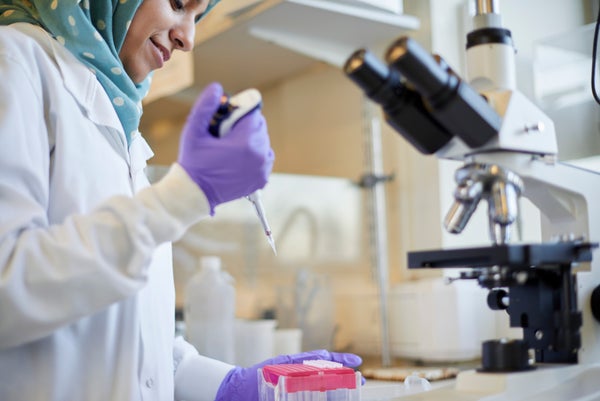本文发表于《大众科学》的前博客网络,反映了作者的观点,不一定代表《大众科学》的观点
科学正受到威胁,世界各地的人们正在动员起来保卫科学。但是,如果我们想支持科学,我们也必须支持使其伟大的东西——多样性。我们一些最重大的发现,如希格斯玻色子和人类基因组序列,之所以能够实现,是因为许多来自不同背景的科学家的集体工作。 多样化的想法对于科学以及解决世界上最紧迫的问题至关重要。然而,为了促进多样性,我们必须面对科学和社会中普遍存在的结构性不平等和歧视。
我们今天——国际妇女节——以及每天都关注科学领域的女性,因为女性是科学领域中最大的代表性不足群体。女性约占世界人口的一半,但只有28% 的研究人员。制度化的歧视形式,如同工不同酬、不充分的产假政策、不灵活的工作时间表、性别规范和工作场所骚扰,往往阻止女性进入 和留在科学事业中。这些障碍意味着我们永远不仅仅是科学家;作为女性,我们必须应对从家庭到工作场所的性别歧视制度和歧视。
我们作为科学界的女性团结一致,但我们永远不仅仅是女性。我们的性别只是我们社会身份和社会地位的一个方面。所有人都具有基于其种族、民族、国籍、残疾状况、性别、宗教、性取向、移民身份和社会经济背景的多种交叉身份。金伯莉·克伦肖 (Kimberle Crenshaw) (1989) 的 交叉性理论 帮助我们理解,这些社会构建的但重要的类别会影响我们生活的方方面面——从我们住在哪里到我们从事什么工作。如果我们只关注科学领域的性别问题,而不明确解决所有形式的特权和不平等,我们就无法消除将不同女性群体赶出科学领域的制度障碍和偏见。
关于支持科学新闻
如果您喜欢这篇文章,请考虑通过以下方式支持我们屡获殊荣的新闻报道 订阅。 通过购买订阅,您将有助于确保关于当今塑造我们世界的发现和想法的有影响力的故事的未来。
科学领域中的性别和种族差距表明,需要在各个层面加强包容性。虽然白人男性和女性各占美国人口的约 30%,但白人男性在科学和工程领域占据 49% 的职位,而白人女性仅占 18%。比例对于黑人和西班牙裔女性也很低,她们分别占人口的 7% 和 8%,但在科学和工程领域仅占 2% 的职位。
不仅数字令人担忧。研究表明,女性在 STEM 领域面临的偏见和障碍从小学开始,一直持续到高级职位。早期,女孩们被老师和同龄人劝阻不要追求科学,因此,她们经常选择退出 STEM 研究。 公开的和无意识的性别偏见继续影响着大学科学课程中的女性,在这些课程中,女学生被认为比男学生知识较少。男性教师倾向于比女性同事培训和雇用更少的女性研究生和博士后研究人员。 与白人男性相比,女性和代表性不足的少数族裔在各个学科中不太可能获得指导。女性的发表也较少,可能是由于“马蒂尔达效应”,其中男性撰写的摘要被认为比女性撰写的摘要具有更高的科学质量。女性也较少被引用,这是学术界衡量价值的标准。
在课堂上,有色人种女性的权威性受到挑战,能力受到质疑,学术专长被诋毁。最近的研究强调,与其它职业领域相比,在 STEM 环境中,对被认定为女同性恋、双性恋或变性人的女性的偏见尤其强烈。因此,女性科学家同时面临着工作场所中来自两个性别的性别歧视、种族主义和恐同症等多种形式的歧视。科学不能简单地试图雇用更多女性,而不解决所有偏见来解决其多样性问题。
我们描述的问题并不新鲜。几个世纪以来,女性一直在为在科学领域获得认可而努力。她们的许多科学贡献仍然不被承认和低估。排除和抹杀女性的科学成就剥夺了有抱负的科学家获得女性榜样的机会,并使关于科学家外貌的性别歧视刻板印象长期存在。承认女性在科学领域中鲜为人知的作用,对于揭示科学事业叙事中持续存在的种族主义和性别歧视也是必要的。
例如,被认为是现代妇产科之父的詹姆斯·马里昂·西姆斯博士,对未麻醉的被奴役妇女进行实验,开发出一种至今仍用于治疗女性的手术。西姆斯博士研究中的女性在很大程度上被从历史记录中抹去。当我们庆祝他的成就而未能承认使这项科学创新成为可能的剥削、暴力和系统性不平等时,我们就是粉饰历史的帮凶。现实情况是,科学界充满了性别歧视和种族主义,只要我们不承认和解决这些问题,它就永远不会拥有最优秀、最聪明的科学家。
为社会正义而战并非超出科学家的职责范围,也不是我们可以在科学不再受到威胁时才放在一旁的事情。捍卫少数群体的权利和消除一切形式的歧视对我们的工作至关重要。倡导科学需要我们倡导女性。倡导女性意味着倡导性别和种族正义。这意味着推进移民、残疾人和 LGBTQIA 的权利、宗教自由,并挑战一切形式的歧视和不平等。
我们需要促进一个多元化和包容性的科学界,将先进的科学解决方案应用于当地和全球挑战。我们需要致力于科学领域的公平,并继续创造一个女性可以在科学研究和职业生涯中蓬勃发展的环境。我们需要为女性科学家组织起来、领导、无所畏惧地分享、建立支持、学习应对我们独特挑战的工具、寻求和提供指导,以及推动科学事业发展提供一个积极的空间。我们需要一个平台来宣传女性的科学成就和故事,这样我们就不会再是“隐藏人物”。这就是为什么今天女性科学家的组织仍然是必要的。
我们不仅仅是科学家;我们是致力于促进社会正义的多元化女性和活动家。
